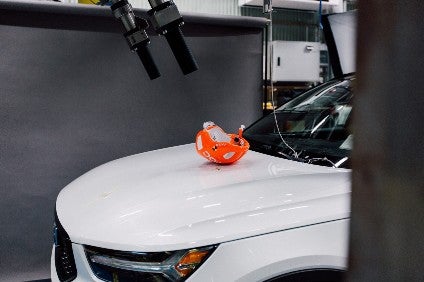
Geely's Volvo Cars said it was teaming up with Swedish sports and safety brand POC for a series of claimed world first crash tests of bike helmets against cars as part of a ground-breaking new research project that aims to further protect cyclists.
Accidents between bikes and vehicles can often lead to serious injury or death, which is why Volvo Cars has a clear strategy to avoid these types of accidents completely with the help of active safety technologies.

Discover B2B Marketing That Performs
Combine business intelligence and editorial excellence to reach engaged professionals across 36 leading media platforms.
Cyclist detection with full auto brake uses the car's cameras and radars to detect cyclists, warn the driver of an imminent collision and apply the brakes if further action is needed. It is a development of automatic emergency braking and pedestrian-detection systems.
The Volvo-POC research project consists of a number of specially designed crash tests at the automaker's safety research facilities in Gothenburg, Sweden, and is part of a wider research project to understand the types of long-term injuries sustained by cyclists.
During these tests, POC bike helmets are worn by crash dummy heads mounted on a testing rig, from where they are launched towards different areas of the bonnet of a static car, at different speeds and angles for various measurements.
The tests are based on existing regulatory test procedures for pedestrian head protection. This allows researchers to make a direct comparison between wearing a helmet and not wearing one.
Current bike helmet testing procedures are fairly rudimentary, involving helmets being dropped from different heights on either a flat or an angled surface, and do not take into account vehicle to bike accidents. The project aims to further refine and advance such testing.
The learnings from the research project will help POC make its helmets safer and more protective in the event of a car-bike accident, while the tests will also provide valuable insights and learnings for Volvo Cars into these types of accidents for future development.
"This project with POC is a good example of our pioneering spirit in safety," said Malin Ekholm, head of the Volvo Cars Safety Centre and one of the company's leading safety engineers.
"We often develop new testing methods for challenging traffic scenarios. Our aim is not only to meet legal requirements or pass rating tests; instead, we go beyond ratings, using real traffic situations to develop technology that further improves safety."
With more than 60 international awards for safety, innovation and design, POC has built a reputation for challenging conventional wisdom and looking at new research, science and innovation to bring forward new ways of thinking to reduce accidents.
"Safety is at the very centre of our mission, and drives all our ideas and innovations," said Oscar Huss, head of product development at POC.
"By working closely with scientific leaders in the POC Lab, we strive to lead the way in introducing new safety ideas. Certification standards are essential, but they should never limit our willingness to look beyond their parameters to find better and more innovative ways to reduce the consequences of accidents."
In an earlier collaboration, Volvo Cars and POC worked on a pilot to connect bike helmets with cars in order to help avoid accidents.






